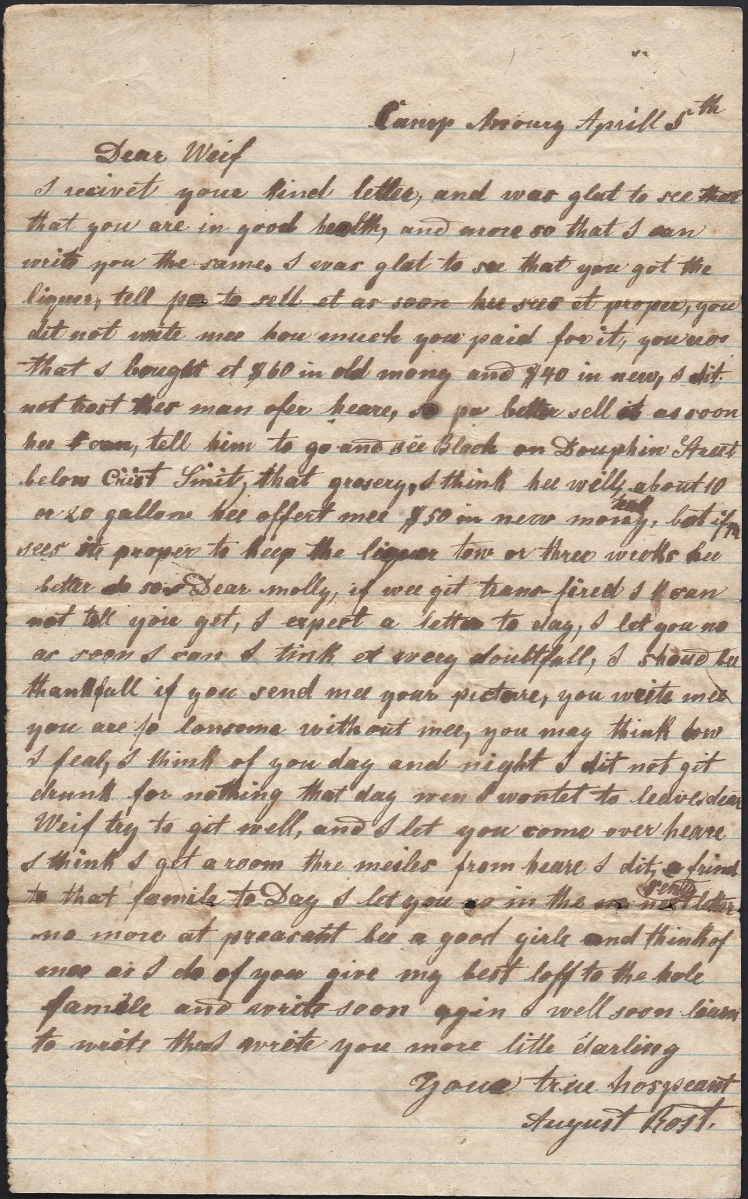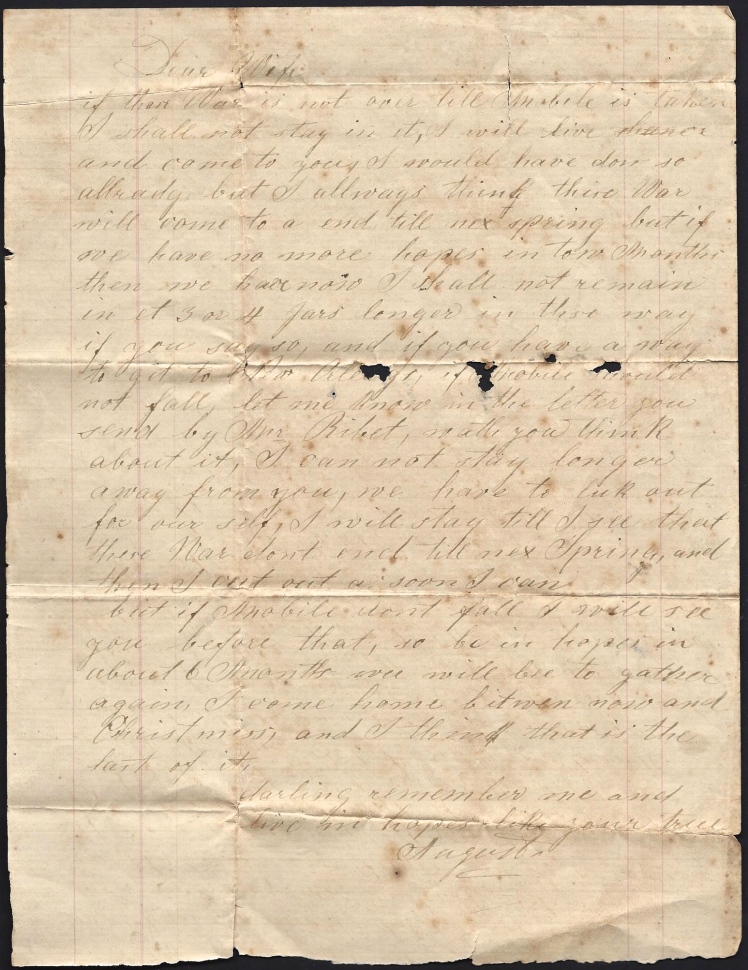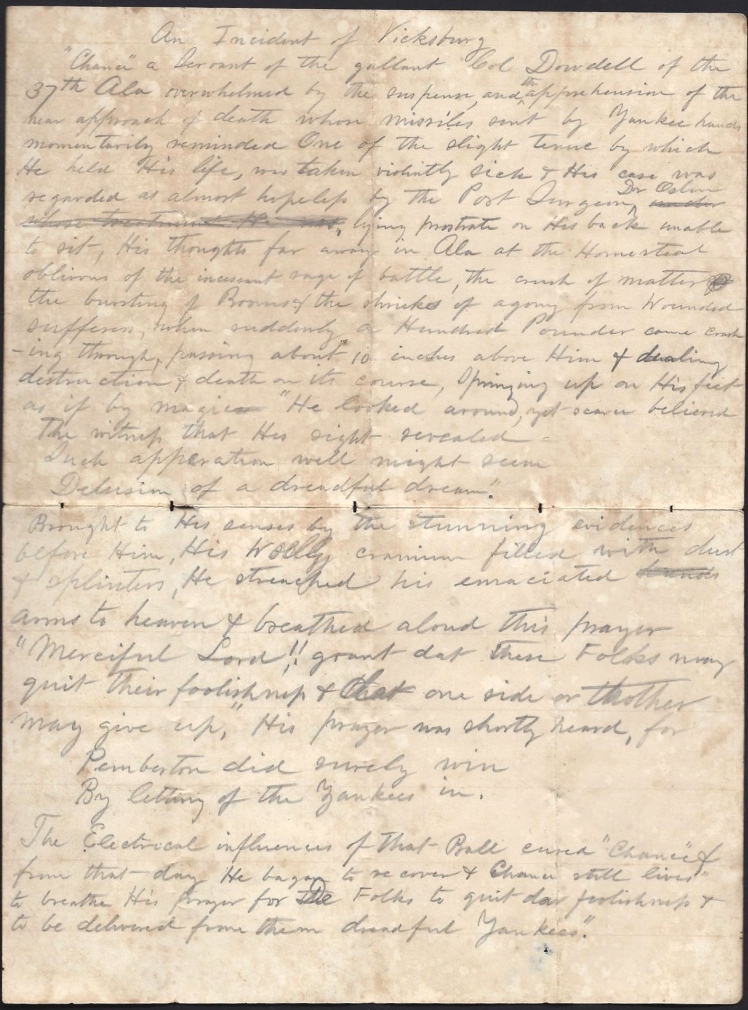These letters were written by August Rost who resided at 193 Dauphin Street in Mobile, Alabama in 1861. His occupation in the city directory was given as “musician.” When the Civil War erupted, Rost enlisted in Gorff’s Company, Mobile Pulaski Rifles. The company went to Virginia in the summer of 1861 but were never assigned to a command and soon disbanded. He later enlisted with the 17th Alabama, serving as the “chief musician” of the band.
The Seventeenth Alabama infantry was organized at Montgomery, August, 1861. Serving first at Pensacola, it was present at the bombardment of that place October 9, 1861. The Seventeenth was distinguished in the battle of Shiloh, taking a prominent part in the capture of Prentiss’ division; served at Mobile from the autumn of 1862 to March, 1864; then joined the army of Tennessee, and, under the command of Gen. E. A. O’Neal, afterward governor of Alabama, fought during Sherman’s campaign from Dalton to Lovejoy’s Station. It was engaged in the battles of Resaca, May 9th, May 13th to 15th; Cassville, May 19th to 22d; Kenesaw Mountain, July 9th to 30th. At Peach Tree Creek its commander, Major Burnett, was severely wounded, and Captain Ragland was killed at Atlanta. The regiment was engaged in the battle of Atlanta, July 22d; at Jonesboro, August 31st to September 1st; and Lovejoy’s Station, September 2d to 6th.
The Seventeenth regiment lost heavily at Franklin, November 30th, and at Nashville, December 13th to 16th. Its field officers were Col. Thomas H. Watts, who became attorney-general of the Confederate States; Col. Virgil S. Murphy; Col. J. T. Jones, temporarily assigned; Lieut.-Cols. Edward P. Holcombe, Robert C. Farris, and John Ryan, temporarily assigned, and Maj. Thomas J. Burnett.
The year on this letter is not given but I believe it was written in April 1863 when the 17th Alabama was camped in the general vicinity of Mobile.
Camp Maury,
April 5th [1863?]
Dear Wife,
I received your kind letter and was glad to see that you are in good health and moreso that I can write you the same. I was glad to see that you got the liquor. Tell Pa to sell it as soon he sees it proper. You did not write me how much you paid for it. You know that I bought it $60 in old money and $40 in new. I did not trust their man over here so Pa better sell it as soon as he can. Tell him to go and see [Charles G.] Block on Dauphin Street below Crist Smith’s. [At] that grocery, I think, he will [get] about 10 or 20 gallon. He offered me $50 in new money but if you see it proper to keep the liquor two or three weeks, he better do 50.
Dear Molly, if we get transferred, I can not tell you yet. I expect a letter today. I let you know as soon as I can. I think it very doubtful. I should be thankful if you send me your picture. You write me you are so lonesome without me. You may think how I feel. I think of you day and night. I did not get drunk for nothing that day when I wanted to leave.
Dear wife, try to get well and I let you come over here. I think I get a room three miles from here. I didn’t find that family today. I let you know in the next letter. No more at present. Be a good girl and think of me as I do of you. Give my best love to the whole family and write soon again. I will soon learn to write, then I write you more, little darling.
Your true husband, — August Rost

TRANSCRIPTION
Marietta [Georgia]
July the 13th, 1864
Dear Wife,
I received your kind letter on Saturday the 11th, and I would have written to you on Sunday but we had to march again from four o’clock in the morning till 12 o’clock that day in [the] hardest rain I did see yet, and never stopped till Monday, 3 o’clock.
Darling, do not listen to what Mrs. Hines said. That is nothing she knows very well. It is not so. Hines is man enough to know his business. All what brought him in the 17th [Alabama] Regiment was $2,000. I did never think that would come in the 17th Regiment and I never would have thought of him if he did not tell me. He wanted to go in my band, if he [could] but got substituted for $2,000. Do not listen to such people. She has enough to do with her husband now and ____ he is not fit to look out for himself. You ought to be proud to hear such things from or against me if I was not over them, they would not [have] took against me, and if it was in the their power to get in the same position, that is all they do not like. They can not do any harm to me if Koun is with me. He is a good boy so I give him liberty to take ____. No more about these things. Paper costs too much money to fill it up with stuff like that.
Mrs. Hines did write a letter to me. You will find the letter in here but do not tell it.
Dear Molly, Ma said that I have forgotten her. I could I ever forget a mother what has borne a good child like you and blessed you to be my wife and will take care of you till I return? Now tell Ma I do love her and not forget her as long as I am blessed with you. I will write more in the next letter I get. No more time.
From your true husband, — August Rost
Chief Musician, 17th Alabama Volunteers
Canty’s Brigade, Polk’s Corps
TRANSCRIPTION
Marietta, Georgia
June the 19th 1864
Dear wife,
I write you these few lines to let you know that I am well and I hope that you are in good health. I was sick for three days but I have [regained my] health again. I ___ ____ ____ if that woman can do you any good, and how you get along if you got any money yet. We will not get money before the fight is over and I cannot come home soon. I have no news to write you. You know more in Mobile than we do here in the army. Give my love to Pa, Ma, and sisters. Your true husband till death, — August Rost
To A. Rost, Chief Musician, 17th Alabama
Canty’s Brigade, Polk’s Corps
I will write more as soon as I get a letter from you, little darling.
TRANSCRIPTION
Atlanta [Georgia]
August 25th 1864
Dear Wife,
I do not receive any letters from you so I sit down and write you [a] few lines to let you know that I am well and I hope that these lines will meet you in the same condition. Darling, let me know if you did receive that note for $200 and if [you] did get that money for it. That money is for you. If Pa did not get his $250, he will get it soon. Darling, did you receive money from our sutler from Montgomery? Let me know. I do not know if my letter did get there or not. If not, I have to write again. I will send you more money as soon as I can get a letter through.
Darling, if you should have to live in Mobile, let me know. I got a good place for you near Montgomery but you must know the best.
Dear Molly, I hope we will soon [be] together again and be happy. I have to close. I do not know what to write before I get a letter from you. Tell me if Ma is well again and how Pa is getting along as a soldier. Do not forget your true love, — August Rost
Goodbye my dear wife.
TRANSCRIPTION
[Sometime in the fall of 1864]
Dear wife,
If this war is not over till Mobile is taken, I shall not stay in it. I will live and come home to you, I would have done so already but I always think this war will come to an end till next spring, but if we have no more hopes in two months than we have now, I shall not remain in it 3 or 4 years longer in this way.
If you say so, and if you have a way to get to New Orleans, if Mobile should not fall, let me know in the letter you send by Mr. Ribet what you think about it. I can not stay longer way from you. We have to look out for ourselves. I will stay till I see that this war don’t end till next spring and then I cut out as soon as I can.
But if Mobile don’t fall, I will see you before that, so be in hopes in about 6 months we will be together again. I come home between now and Christmas and I think that is the last of it.
Darling remember me and live in hopes like your true, — August

The 17th Alabama was not among the Confederate troops in Pemberton’s army defending Vicksburg so this story is unconnected to that regiment. Most likely it was copied by the Rost family from an Alabama newspaper after the war. That Col. Dowdell of the 37th Alabama had a slave named “Chance” with him at Vicksburg serving as his personal attendant is corroborated by a story I have footnoted.
An Incident of Vicksburg
“Chance” ¹ — a servant of the gallant Col. [James Ferguson] Dowdell of the 37th Alabama — overwhelmed by the suspense and the apprehension of the near approach of death when missiles send by Yankee hands momentarily reminded one of the slight t___ by which he held his life, was taken violently sick & his case was regarded as almost hopeless by the Post Surgeon, Dr. [John Wimblish] Oslin. Lying prostrate on his back, unable to sit, his thoughts far away in Alabama at the homestead oblivious of the incessant rage of battle, the crush of matter, the bursting of booms & the shrieks of agony from wounded sufferers, when suddenly a hundred pounder came crashing through, passing about 10 inches from him & dealing destruction & death on its course. Springing up on his feet as if by magic, he looked around, yet scarce believed the witness that his sight revealed. Such operation well might seem delusion of a dreadful dream.
Brought to his senses by the stunning evidences before him, his wooly cranium filled with dust & splinters, he stretched his emaciated arms to heaven & breathed aloud this prayer, “Merciful Lord!! grant dat them folks may quit their foolishness & that one side or ‘tother may give up.” His prayer was shortly heard for
Pemberton did surely win
By letting of the Yankees in.
The electrical influences of that ball cured “Chance” & from that day he began to recover & Chance still lives to breath his prayer for the folks to quit dar foolishness & to be delivered from them dreadful Yankees.
¹ Following the siege of Vicksburg (July 1863), “… To prevent the indignity of the capture of the flag of the 37th, Colonel Dowdell had instructed his body servant, Chance, that if surrender came he was to take the flag, fold it under his saddle blanket on his mule so it would not be noticed and so ride out with it. This Chance did, and thus the Flag was saved … Chance was made a prisoner with the Regiment, but kept the Flag hidden. …” A circumstantial bit of information supports this story; it is noted in the Inventory Records of the Probate Court of Chambers County, Ala., 1834-1866, (Vol. 6, pg 92), the name of a slave owned by James Dowdell on 3 April 1856 appears to be recorded as “Chancy.” [see Regimental Flags]
According to another story published on the web, Dowdell’s slave “Chance” made the flag staff that carried the flag of the 37th Alabama. [see Confederate Ancestors]







One thought on “1863-4: August Rost to Mary Rost”